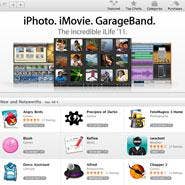Mac App Store Launch Helps Apple Keep App Stranglehold

The Apple Mac App Store has been in the works for months, and Apple partners have been awaiting its opening.
The Cupertino computer giant opened up the Mac App Store with 1,000 free and paid apps. Users can buy apps using their iTunes accounts. As they are in Apple's iPhone App Store, apps are downloaded and installed directly onto the device. At launch, the Mac App Store is available to Snow Leopard users through a software update as part of Mac OS X v10.6.6.
"With more than 1,000 apps, the Mac App Store is off to a great start," Apple CEO Steve Jobs said in a statement. "We think users are going to love this innovative new way to discover and buy their favorite apps."
Like its other App Store brethren, the Apple Mac App Store will offer apps in several categories, like education, games, graphics and design, lifestyle, productivity, utility and others. Users can browse apps, see staff favorites and look up free and paid apps by ranking, rating and sales.
Additionally, the Apple Mac App Store launches with several entirely new apps from the likes of Autodesk, Ancestry.com and Boinx. And Mac staples like iPhoto, iMovie, GarageBand and more Apple iLife 2011 apps are also available individually through the Mac App Store for $14.99 each, while Pages, Keynote and Numbers from iWork are each available for $19.99. Meanwhile, Aperture 3, Apple's photo editing and management software comes in at a cool. $79.99.
Apple single-handedly sparked the global app craze with the launch of its iTunes-based App Store in 2008. Since then, Apple's App Store has grown to hundreds of thousands available apps and as of January 2010 hit 3 billion downloads.
Apple competitors were soon to follow, with rival smartphone operating system Google Android launching its own Android Market and BlackBerry maker Research In Motion (RIM) following up with BlackBerry App World. So far, though, none have been able to unseat Apple. Google also recently launched an app store around its Chrome browser that leverages Web-based cloud applications as opposed to downloading apps to the device, like Apple's Mac App Store.